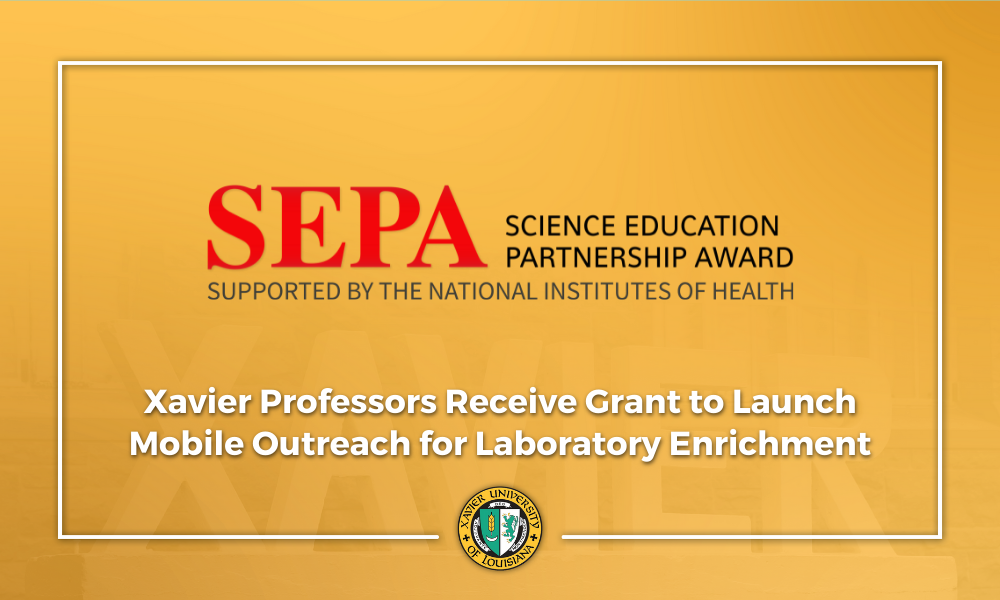Xavier Professors Receive Grant to Launch Mobile Outreach for Laboratory Enrichment

Dr. Mehnaaz Ali, associate professor of chemistry, and Dr. Abha Verma, assistant professor of chemistry, have been granted funding for the Xavier University of Louisiana- Mobile Outreach for Laboratory Enrichment (XULA-MOLE) project through the National Institutes of Health (NIH) Science Education Partnership Award (SEPA) program.
Initiated at the beginning of the fall 2021 semester, The XULA-MOLE program seeks to influence and increase the interest of high school students of color in the STEM and biomedical fields. It is a collaboration between the XULA-MOLE team and three local high schools with student populations greater than 80 percent Black and African American.
The XULA-MOLE project is based on a combination of multiple initiatives, including building on Dr. Verma’s previous efforts in hosting high school students at Xavier to visit participating research and teaching labs.
The project uses guided inquiry-based modules to impact the young student’s understanding of fundamental scientific content. Inquiry-based learning is the practice of solving a problem using possible solutions and proposing an explanation for the problem at hand. This approach to laboratory learning allows students to explore and investigate problems and formulate solutions through their observations and reflections.
By the time the project concludes in five years, seven local schools will be collaborators, with an aim to work with more than 2500 high school students.
A major part of the inquiry-based research derived from a service-learning initiative implemented in 2012 with P-12 schools where Xavier student volunteers developed and taught stand-alone science experiments in the science classrooms of participating schools as part of an outreach program.
The objective of that outreach project was to provide middle and high school students with 4-5 hands-on science experiments each semester and enhance XULA students’ understanding of science content by helping to develop these science experiments.
Similar to the previous service-learning initiative, an integral component of the XULA-MOLE project is the implementation of “near-peer mentoring,” with Xavier students at the heart. The Xavier students who participate in the project work in a team to design the thought questions and experiments that the high schoolers carry out to explore various topics.
“XULA students, who have participated as volunteers for the preliminary work on this project, have pointed out increased self-confidence and a measure of the leadership capabilities they have acquired through the peer-mentoring process,” said Dr. Ali. “Subsequently, the high school students who have been part of the preliminary project have appreciated the non-chemistry topics they have discussed with the XULA students with respect to applying to college, financial aid, and career aspirations.”
Research indicates that such mentorship is beneficial for both the mentor and mentee. Former Xavierite Veronica Miles (‘17) shared her great experience in the program.
“As an outreach student, I inspired many high school students to consider a secondary education,” said Miles. “Through outreach, I was able to gain experience in teaching, leadership, grant writing, and experimental design, all of which I have been able to apply post-graduation.”
Miles said that she truly enjoyed her time as an outreach student and highly recommends the participation of other students. Because of Hurricane Ida, the selection of new student volunteers for the program launch has been postponed but will commence soon.
Beyond mentoring and inquiry-based learning, the project is also implementing professional development programs for teachers. Dr. Ali said that the team is using feedback from other workshops to develop the week-long workshop in collaboration with Xavier’s Center for the Advancement of Teaching and Faculty Development (CAT+FD). The tailored workshops target pedagogical topics, new teaching skills and research project design training for the participating science teachers.
But the biggest impact of the program remains focused on the students, both at Xavier and those still in high school.
“This SEPA funded project will be impactful in not just training XULA students to be effective science leaders and mentors- It will be integral in increasing the interest of high school students in pursuing careers in the STEM fields or in biomedical sciences to impact public health literacy and increase workforce diversity.” said Dr. Ali.